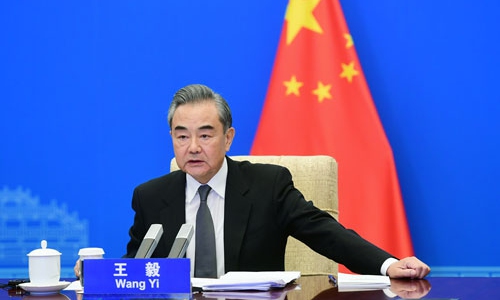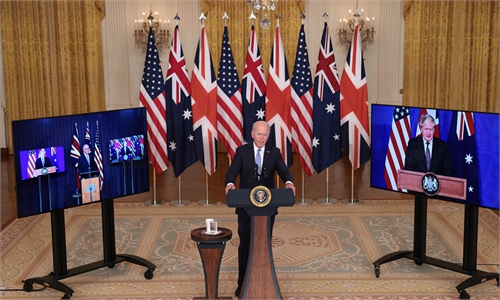China warns against AUKUS, to make meetings routine with Pacific island countries, enhancing ties to higher level

Wang Yi
Chinese State Councilor and Foreign Minister Wang Yi warned of nuclear spill from the tripartite alliance AUKUS, during a meeting with foreign ministers of Pacific island countries on Thursday.
Observers said those countries mirrored China's concerns about AUKUS, as the deal of AUKUS will push the region from the "heaven of peace and happiness" to the "brink of war."
Speaking at the first China-Pacific Island Countries Foreign Ministers' Meeting by video link, Wang pointed out that AUKUS will jeopardize the South Pacific Nuclear Free Zone Treaty, introduce an arms race and damage regional peace and stability. China is willing to work with the Pacific island countries to safeguard the international nuclear non-proliferation system with the Nuclear Non-proliferation Treaty as the cornerstone and the nuclear free zone in South Pacific.
By joining AUKUS, Australia will officially become a nuclear-armed country, which would stir up the peaceful atmosphere in the region, and push the region from the "heaven of peace and happiness" to the brink of violence, Chen Hong, a professor of Australian Studies at East China Normal University in Shanghai, told the Global Times on Thursday.
Such situation worries the islands that have a delicate and fragile ecological environment and are unable to defend themselves, Chen noted.
"In contrast to China bringing peace and improvement to local people's lives, Australia's move shows its negligence of its neighbors' concerns and a lack of respect for these sovereign countries, as it is willing to be a pawn of the US in its Indo-Pacific strategy to secure US hegemony," he said.
China will establish a climate change cooperation center with Pacific island countries to support their call for building a blue Pacific, and China will continue to sponsor the Pacific Regional Environment Programme, Wang said.
Wang also proposed establishing a routine meeting mechanism between foreign ministers of China and Pacific island countries, which received the approval of participating ministers, read a press release by Chinese Foreign Ministry.
Observers hailed such a development as it shows that relations between China and Pacific island countries have been raised from trade cooperation to a higher diplomatic level, and we could see more comprehensive cooperation among them.
The scope and depth of cooperation between China and the island countries have continued to expand, said Yu Lei, chief research fellow at the research center for Pacific island countries in Liaocheng University, East China's Shandong Province.
From trade and investment to infrastructure cooperation, the two sides have accelerated their cooperation in areas such as safeguarding regional peace, tackling climate change, securing the sovereignty and independence of island countries, and protecting the legitimate interests of island countries in the international community, Yu told the Global Times.
According to the Chinese Foreign Ministry website, attending ministers of the Pacific island countries spoke highly of China offering vaccines as an international common commodity, and said they are willing to work with China in areas such as adhering to multilateralism, responding to climate change and other international issues, and jointly safeguarding the common interests of developing countries.
They also reaffirmed their commitment to safeguarding the international nuclear non-proliferation system and the South Pacific Nuclear-Free Zone.


